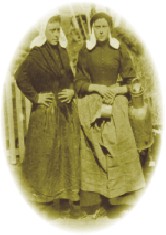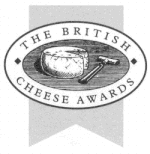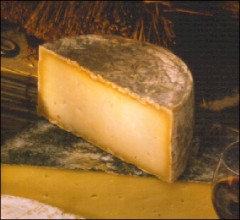
Issue No. 3 - October/November 1998
|
|
|
 |
|
|
|
Telephone
help and advice line:
020 8940 1944
Monday to Friday
9:30am to 5.30pm
|
|
|
Welcome once again to the Teddington
Cheese Wire. Included in this issue is news of the British
Cheese Awards which were held at the end of September. We
also have pleasure in enclosing our new Cheese List to help
you identify the cheeses you have not yet savoured.
|
 Normandy milk maids of the 1900's
Normandy milk maids of the 1900's
|
No doubt many of you have heard about the
extraordinary theft that took place at Manor Farm, North
Cadbury in Somerset. James Montgomerys' entire stock of
extra mature cheddars, valued in excess £30,000, was stolen.
We continue to hope that the cheese will be recovered .
|
| At the Teddington Cheese
we are busy behind the scenes getting ready for our busiest
season, even though the tinsel and Christmas hats stay hidden
for another few weeks. If you would like to place an order for
Christmas you can do so and we will reserve your cheese, port
etc., for you. Your order will then be sent on to you during
the Christmas week. We can also organise hampers and cheese
selections as gifts, and include a greeting card - no need to
leave all your shopping to the last minute. Of course, you don't
need to wait for Christmas to enjoy a good cheese! |
|
|
The British Cheese
Awards explained
There have long been
competitions for onion growing, beer making, quilting,
bread baking .......... and cheese making. The most
famous gatherings include the Nantwich Show and the
Bath and West Show but there are many others all of
which attract the local producers along with those who
are prepared to travel longer distances to show their
cheeses. The majority of these shows are trade shows
intended for makers, wholesalers, retailers and the
trade press. They ignore all but the keenest from amongst
the cheese eating public. However, five years ago a
new competition was founded - the British Cheese Awards.

Mr John Dutton, Swanley Hall, Nantwich
1908
Mr Dutton was renowned for his Cheshire cheese-making
in the early 1900's with endless awards at cheese shows
in both the north of Endland and London.
The objective of the
British Cheese Awards is to raise awareness of cheeses
made in Great Britain by bringing together the whole
of the cheese industry - makers, maturers, retailers,
the trade press and now, significantly, the consumer
press. The Awards encompass all cheese making from the
smallest producer through to large multi-national companies,
from specialist cheeses destined for the tastiest cheese
board through to grated cheddar used on the frozen ready
meal at your local supermarket.
This year there were
some 594 entries divided into sixteen categories, for
example, 'Cheshire Cheese'. One cheese in each category
is chosen as the overall winner. In addition each category
is sub-divided into a number of different classes -
for example, 'Traditional White Cheshire', 'Traditional
Coloured Cheshire', etc. All cheese is examined and
the best ones are awarded a Bronze, Silver or Gold medal.
This year 168 cheeses received a medal of which 72 were
bronze, 52 silver and 42 gold.

Awards are also given
for the best Scottish cheese, the best Irish cheese,
etc., and from all these winners a Supreme Champion
is chosen. The Supreme Champion this year was Celtic
Promise - an unpasteurised cows' milk cheese made by
John and Patrice Savage at Glynhynod Farm. The cheese
is washed in cider and matured by James Aldridge in
Godstone, Surrey. It has a firm smooth texture, a sticky
pink-brown rind and a musty flavour and aroma.
|
|
The Bristish Cheese Awards
STATISTICS
|
| Year |
1994 |
1995 |
1996 |
1997 |
1998 |
|
| Number of cheeses entered |
296 |
475 |
486 |
506 |
504 |
|
| Number of producers |
97 |
137 |
138 |
141 |
156 |
|
| Number of cheese per category |
| Fresh young |
34 |
66 |
49 |
65 |
65 |
| Soft white |
15 |
22 |
28 |
27 |
32 |
| Semi-soft |
9 |
14 |
18 |
17 |
22 |
| Cheddar |
60 |
94 |
87 |
92 |
113 |
| Cheshire |
20 |
15 |
12 |
16 |
18 |
| Lancashire |
14 |
13 |
13 |
13 |
14 |
| Red Leicester |
10 |
12 |
13 |
12 |
15 |
| Wensleydale |
4 |
7 |
8 |
7 |
8 |
| The Gloucester's |
11 |
16 |
13 |
15 |
22 |
| Caerphilly |
1 |
8 |
7 |
6 |
12 |
| Other territorials |
5 |
6 |
3 |
6 |
7 |
| Modern British: hard |
30 |
60 |
57 |
69 |
88 |
| Reduced fat |
10 |
15 |
12 |
14 |
21 |
| Blue cheese |
22 |
30 |
35 |
34 |
37 |
| Speciality |
34 |
81 |
61 |
82 |
3 |
| New/ experimental |
17 |
16 |
34 |
31 |
37 |
| Number
of each milk type: |
| Buffalo |
0 |
1 |
1 |
3 |
6 |
| Cow |
243 |
361 |
340 |
393 |
462 |
| Ewe |
20 |
42 |
44 |
46 |
55 |
| Goat |
32 |
72 |
64 |
64 |
69 |
|
| Unpasteurised |
60 |
126 |
144 |
151 |
187 |
| Vegetarian |
253 |
403 |
380 |
453 |
561 |
| Organic |
4 |
14 |
14 |
17 |
28 |
| Number
of cheeses per country |
| England |
252 |
333 |
339 |
364 |
424 |
| Ireland |
0 |
43 |
45 |
41 |
47 |
| Scotland |
24 |
54 |
47 |
47 |
64 |
| Ulster |
3 |
1 |
7 |
3 |
0 |
| Wales |
16 |
39 |
48 |
51 |
59 |
| Number
of medal winners |
| Bronze |
46 |
70 |
73 |
71 |
72 |
| Silver |
35 |
51 |
57 |
54 |
54 |
| Gold |
30 |
30 |
33 |
31 |
42 |
| |
|
|
|
|
|
|
|
|
Cheese focus:
Ewes' milk Swaledale
The Swaledale Cheese Company, Richmond, North
Yorkshire, England

Swaledale and other cheeses such as Wensleydale,
Cotherstone and Coverdale were introduced into England by monastic
orders who settled in the Yorkshire dales after the Norman conquest
of 1066. French monks were accustomed to making ewes' milk Roquefort
and were encouraged by the invaders, who yearned for foods from
their homeland, to move to England and continue their cheese making.
Consequently, the first Swaledales were blue cheeses and it has
only been over the last century that the Swaledale has become better
known as a non-blue cheese. After the dissolution of the monasteries
in the 16th century, production moved to farmhouses and later to
small dairies.
Over the past hundred years, farming in the dales
has moved from sheep to cattle rearing, and the traditional ewes'
milk cheese has become a rarity. Our Swaledale is made by David
and Mandy Reed. They started cheese making in 1985 and took over
the production of Swaledale from Marjorie Longstaff of Harkerside
in Upper Swaldale when she retired. Although the majority of their
production is from cows milk they do still produce some of the traditional
ewes' milk cheese. It is this ewes' milk cheese which we sell. Their
farm animals graze on the upland slopes of the Yorkshire Dales National
Park in an area which is designated as 'environmentally sensitive'
and where farmers are discouraged from using artificial fertilizers.
Swaledale is generally matured for three to four
weeks and is enjoyed when mild, moist and creamy. It has a white
paste and develops a fine grey moulded rind. We mature our cheeses
for a further four to eight weeks to give a drier texture and a
more pronounced flavour. In fact, during the 19th century the ewes'
milk Swaledale was sometimes kept for 3 to 4 years becoming extremely
pungent and served as a great delicacy at the dinner table.
Swaledale can be made successfully throughout the
year but cheeses made in late Spring are the most reliable in quality.
Each cheese is approximately 2kg in weight, 150mm in diameter, 80mm
high and has a fat content of 45%.
|

Above: Lambing is in early spring which
means that the ewes dry out during the winter months leading
to a shortage of ewes' milk cheeses during this period. Full
milk production only resumes once lambing is complete.
|
Back to top
|
|
- Cheese Tips -
Taking
your cheese on a long journey
At the shop
we are often asked the best way to take cheese on a long journey,
particularly a plane journey. Keep the cheese wrapped in the
waxed paper in which we sell it. Never wrap it in cling film
or in a plastic bag since this causes the cheese to sweat.
Next, loosely over-wrap the cheese in a damp tea towel and
place it inside a tupperware box. This will help trap the
smell of the cheese. Ensure that the box is only lightly packed.
If you are making a long journey include an ice pack in the
box but do not allow it to come into direct contact with the
cheese. Pack the cheese just before the journey and return
it to a cool place as soon as possible after arriving.
|
|
|
CHEESE
SHORTAGES DURING CHRISTMAS
The
majority of farms that we deal with are small and, in the
interest of quality, they use only the milk from their own
animals. Unfortunately, the farmers are unable to persuade
their animals to produce more milk just because it's Christmas.
On the contrary, milk yields of sheep and goats fall dramatically
in the winter and return to normal after they have had their
lambs and kids in the spring.
All our cheese
orders were placed with the farms many months ago. Our small
Montgomery truckles are ordered and made in February and our
baby Stiltons in August. We cannot order more at the last
minute since the farms will have no more to sell.
Soft cheeses
require particular care. They are matured ready for sale at
Christmas and we hope only to have small amount remaining
by the end of Christmas Eve. Since we have thirty different
soft cheeses we have to estimate the amount we will need of
each.
It
is inevitable that many of our cheeses are going to sell out
and you may not have your favourites on the Christmas table.
Please, please can you take the time to place an order as
soon as possible. We hate to disappoint.
|
|
|
Cheese competitions - a critical
view
Cheese shows are an ideal forum for cheese
makers, cheesemongers and retailers to meet together to discuss
the world of cheese. At the Teddington Cheese we find that
it gives us an ideal opportunity to make contact with new
British and Irish cheese makers and to meet with our regular
suppliers.
At each show there is usually a competition
and nearly all cheese makers enter their cheese into one show
or another during the year. There can be no denying that the
cheese maker takes the competition seriously and takes great
pleasure in winning a medal or prize. However, most of these
same cheese makers would admit to the competition being somewhat
of a lottery because:
|
| a.
Cheeses vary enormously from one season
to another depending on what the animals are being fed on. In
the spring they may be grazing in meadows full of spring flowers.
At harvest time they may be feeding on stubble left by the harvest
and in the winter they may be indoors and fed on silage. Since
cheese competitions are held throughout the year, a particular
cheese which won a gold medal in the summer may not necessarily
be superb in the winter. |
b. During maturation
cheeses gradually dry out and the flavours intensify. There
is a balance to be struck between flavour, texture and appearance.
One person may prefer a particular cheese to be moist, mild
and eaten when young, whilst another may prefer the same cheese
to be fuller-flavoured and older. Although some categories of
cheese have classes for different ages, cheddar for instance,
the majority do not. The maker gambles on the age of cheese
to send. |
c. Personal
preferences are a major factor - each cheesemonger in our shop
has his or her own favourites. However, it must be said that
some cheeses feature on everybody's list of preferences. On
some occasions a cheese which may not usually be a favourite
will mature to surprise us all. It will, of course, sell out
rapidly. Judges are no exception in having personal preferences.
|
d. Many small
producers simply do not have the funding to enter many competitions.
It is expensive to take time out from their cheese making, to
travel to the venue and of course to sacrifice a whole cheese
to the tasters. Large producers can afford these costs and can
enter cheeses into many categories giving them a greater chance
of winning something. |
e. The conditions
at the competition venue can have an influence on the judging.
During transportation or a day spent in a warm room some cheeses
may suffer more than others and may pass their best before they
are judged. This is true of softer lactic cheeses which can
degrade quite quickly. However, as a general rule most cheeses
will improve as they warm up. |
|
There is no doubt that events such as the
British Cheese Awards build up an awareness and appreciation
of British cheese. The publicity surrounding an event is invaluable
to building and strengthening the position of British cheese
in this country and the rest of the world. However, the results
of competitions should be kept in perspective and every individual
should make up their own mind as to which medals they would
award to which cheeses.
Article in response to readers letter:
"Dear Teddington Cheese, I often buy cheese and get together
with freinds to enjoy them. We have our own competition where
we choose our favourites but we are never able to agree. What
makes a competition winning cheese?"
- Mrs Morris, Penrith.
|
|
 |
 |
 |
| BACK TO TOP |
|
|
| All
articles © www.teddingtoncheese.co.uk
|
|






